
Lines of research
- Teacher training through academic research. Teacher training is crucial for any education system. Continuous improvement of teachers’ training processes and experiences is essential so that they can become reflective educators who are aware of the role that social sciences learning can play in students’ exercise of democratic citizenship. SOCIAL(S) explores the identity of teachers in their historical context, initial and in-service training, and gender and coeducation in teacher staff.
- Curricular materials and teaching methodologies. Textbooks, digital resources and fieldwork, complemented by different teaching methodologies, are tools and strategies used for different purposes in school activities. These resources also serve as documentary sources for research in the didactics of social sciences. We analyse curricular materials, legal regulations, external tests and proposals for curricular innovation, especially concerning curricular projects. In addition, we focus on studying educational technology and the didactics of social sciences, paying attention to the teaching methodology used, classroom resources and pedagogies and hidden meanings embedded in 21st century schools.
- Social representations and identities (gender, nation and interculturality). Individual and collective identities are complex to define. Social identities are “traits that characterise an individual or group in relation to others”, as well as the ”awareness that a person has of oneself and how they differ from others”. Thus, SOCIAL(S) focuses on school learning as a framework that shapes identities and social representations, beyond the common sense socially reproduced and expressed in the media. We take into account the historical-cultural dimension of school disciplines and the tendency to naturalise certain contents, practices and uses that hinder innovation.
- Socio-environmental education and heritage education, locally and globally. Understanding complex social and environmental issues requires an interdisciplinary approach to the study of geography, history and art history. This approach must integrate heritage and sustainability perspectives. This also involves examining the cultural significance of places to understand why certain remains or environments are selected and preserved, which may be present in school environments such as museums, archaeological sites, natural parks, monuments, celebrations or festivities. Interdisciplinary approaches address cross-cutting concepts such as sustainability.











